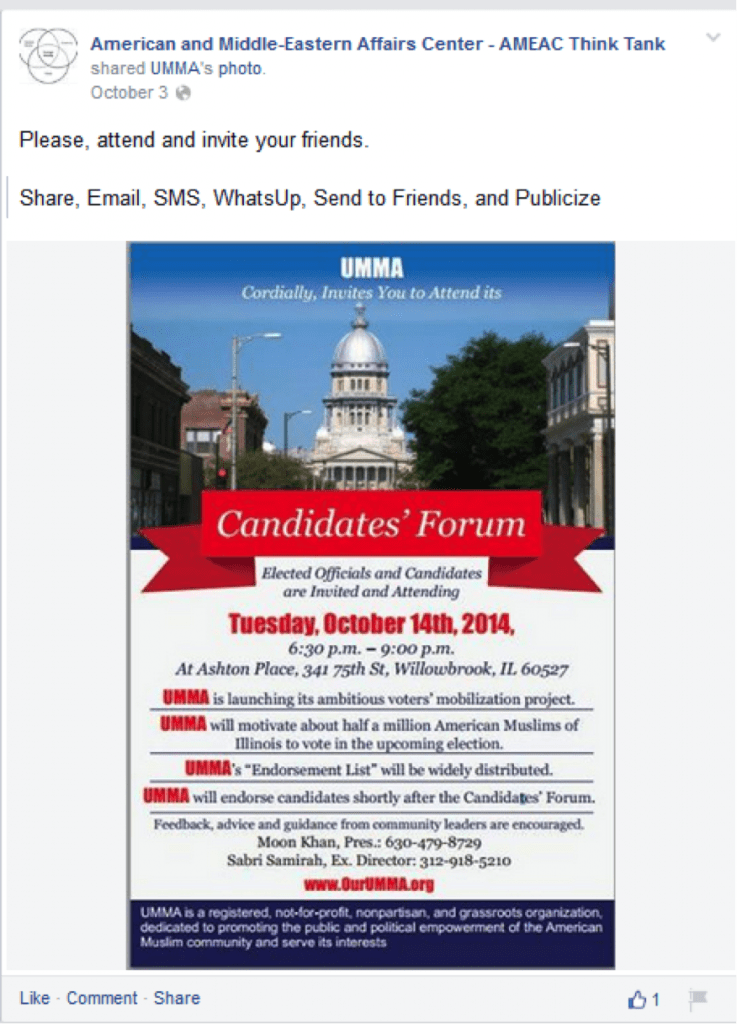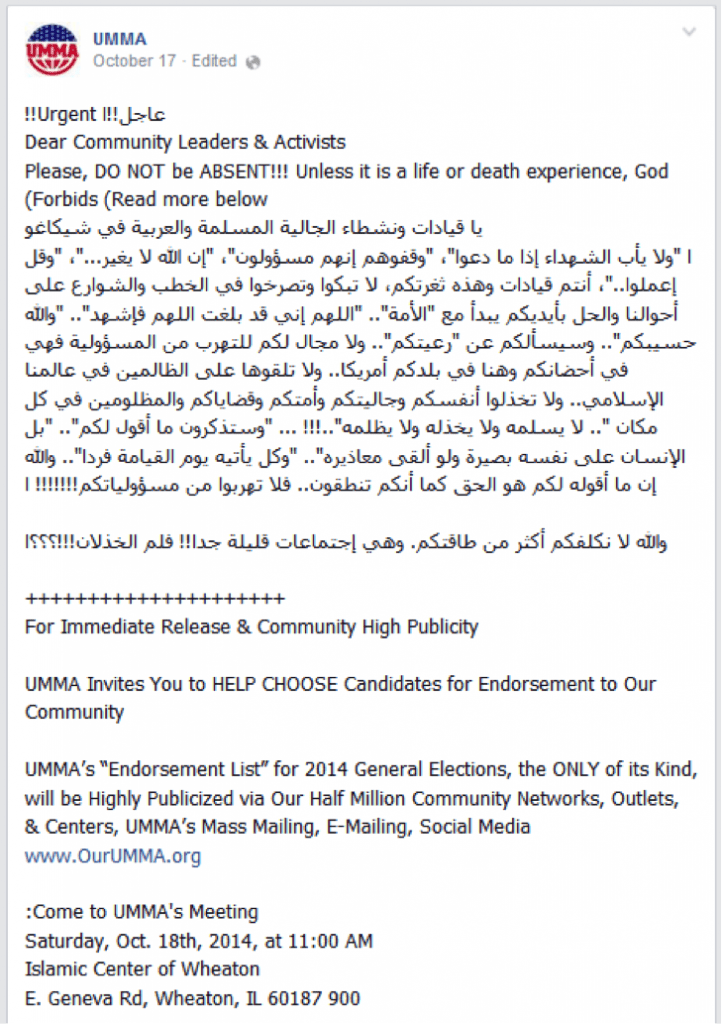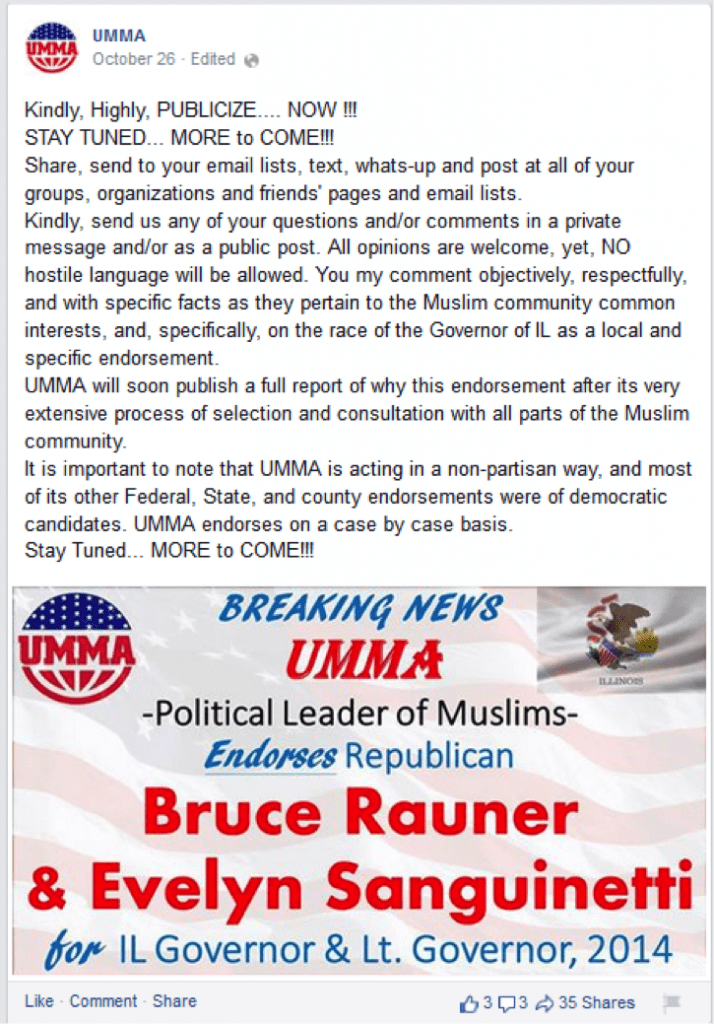UMAA Rising: USCMO Takes Aim at Illinois Politics
In this, the final segment in the Center’s series on the USCMO (United States Council of Muslim Organizations), the first U.S. political party openly associated with the jihadist Muslim Brotherhood, the rise of the UMMA (not an acronym but the full name of the group) follows shortly on the return of Sabri Samirah, member of the Jordanian Muslim Brotherhood, to the U.S. following eleven years of exile. Once Samirah’s travel ban was lifted by the Obama administration in early 2014, he returned quickly to the U.S. and launched into a busy schedule of appearances and speeches to galvanize the U.S. Muslim community to political activism.
By 23 September 2014, Samirah’s new organization, Our UMMA, which succeeded UMAA (United Muslim Americans Association) to promote the political ambitions of the Muslim Brotherhood formally had been established with the Illinois Secretary of State’s office. The following picture is a screenshot from the Illinois Secretary of State’s office with the corporation file detail report for UMMA where Sabri Samirah is named as the registered agent.
While Samirah had publicly announced the news through Twitter and Facebook that the new community grassroots organization was to be tentatively named the United Muslim & Arab Americans Association (UMAAA), the official announcement dated 3 October 2014 declared the name as UMMA, which was to be associated with a forthcoming website at www.OurUMMA.org.
Per one of his Facebook pages Samirah describes UMMA as “a registered, not-for-profit, nonpartisan, and grassroots organization, dedicated to promoting the public and political empowerment of the American Muslim community and serve its interests.” Additionally, a preview for UMMA’s first event scheduled for 14 October 2014 appears in the following screenshots from Samirah’s Twitter and Facebook accounts. 

 When the UMMA held its first candidates’ forum on 14 October 2014 in Dupage County, several dozen candidates spoke to the audience numbering around 100 individuals. The vast majority of the local, state, and federal candidates were Democrats with the exception of a handful of Republicans. As noted on the UMMA website, “The goal is to communicate with and educate candidates and officials, and ask them to respond. Let us have no illusion, the stronger constituency we are, the more forthcoming they will be toward us. We should have no wishful thinking! Yet, we have great numbers and resources. Once we have a stronger role in elections, everybody will be seeking our support!” It was made clear at this initial candidates’ forum that if the Muslim community delivered votes translating to key victories for candidates, then future candidate forums could involve 100 or more candidates seeking Muslim votes.
When the UMMA held its first candidates’ forum on 14 October 2014 in Dupage County, several dozen candidates spoke to the audience numbering around 100 individuals. The vast majority of the local, state, and federal candidates were Democrats with the exception of a handful of Republicans. As noted on the UMMA website, “The goal is to communicate with and educate candidates and officials, and ask them to respond. Let us have no illusion, the stronger constituency we are, the more forthcoming they will be toward us. We should have no wishful thinking! Yet, we have great numbers and resources. Once we have a stronger role in elections, everybody will be seeking our support!” It was made clear at this initial candidates’ forum that if the Muslim community delivered votes translating to key victories for candidates, then future candidate forums could involve 100 or more candidates seeking Muslim votes.
In a post to the Muslim community from his Facebook page, Samirah made the following points on 17 October 2014 regarding the promotion of candidates:
- In addition, UMMA’s endorsements, fully take into consideration political realities, electoral competitions, future strategic calculations, our community’s concentrations, and common interests with other communities. Officials, candidates, political parties, and the media will take us more seriously in the future because of our effective and unified actions of today.
- In finalizing this list, UMMA’s bottom line measure is to make sure that candidates effectively and publicly RECOGNIZE rights and interests of our community. Gradually, our community should be accepted as an integral part of the larger society and a player in the public decision-making process.
- Indeed, NO ONE will listen to our grievances if we are not a strong player in the game and/or are only shouting from the sidelines! Before we ask with high expectations and/or hopelessness, we need to show our strong participation and unified leadership. Many other society’s segments have done it.
These points from Samirah’s post confirm what was previously discussed at the meetings held on 5 August 2014 in Bridgeview, Illinois and 14 October 2014 in Willowbrook, Illinois. Appearing on the UMMA website, the following page “Issues and Positions of the Muslim Community, UMMA Serves” is a delineation of fourteen specified areas of importance for the UMMA to present to candidates and officials.
According to a rather exaggerated estimate at the UMMA website, there are about 7 million Muslims in the U.S. (The actual number is likely closer to about 3 million.) Per their figures for the State of Illinois from the UMMA, there an estimated 500,000 Muslims with 400,000 of those in the greater Chicago area (250,000 in Cook County and 150,000 in Du Page and surrounding counties). The UMMA also notes that Muslims may account for up to 15% of the population in some congressional and state districts, and cities and villages in northeastern Illinois. While these numbers probably are at least somewhat exaggerated, UMMA’s intent and objectives are clear: encourage political involvement of that segment of the electorate that self-identifies as “Muslim” to create a voting bloc that candidates and parties will seek out for support in future elections.
When the UMMA website was launched in October 2014, a series of photos appeared in the banner section. The screenshots of the following pictures are an example of what appears on Samirah’s UMMA website, obviously seeking to portray a patriotic message from the Muslim Brotherhood. This includes a picture of Islamic minarets superimposed on the American flag. A picture of President Barack Obama stating “The future must not belong to those who slander the prophet of Islam” mysteriously disappeared from the website.
 Samirah’s research to determine Muslim population centers in jurisdictions where they can affect key election outcomes is indicative of his underlying strategy for the Muslim Brotherhood to establish a unified voting bloc. Launching an ambitious voter mobilization program aligned with key issues sets the stage for future elections. This strategy emerged clearly at the August 2014 meetings when Samirah and those present discussed co-opting non-Muslim (especially African American) communities with which Muslims propose to join in solidarity on such themes as civil rights issues, in return for these communities backing issues of prime importance to the Muslim community.
Samirah’s research to determine Muslim population centers in jurisdictions where they can affect key election outcomes is indicative of his underlying strategy for the Muslim Brotherhood to establish a unified voting bloc. Launching an ambitious voter mobilization program aligned with key issues sets the stage for future elections. This strategy emerged clearly at the August 2014 meetings when Samirah and those present discussed co-opting non-Muslim (especially African American) communities with which Muslims propose to join in solidarity on such themes as civil rights issues, in return for these communities backing issues of prime importance to the Muslim community.
Before USCMO member Islamic Center of Wheaton hosted Samirah and the UMMA on 18 October 2014, Samirah sent a message with a sense of urgency regarding the Muslim community participating in the midterm election. This was for strategic purposes as the UMMA political endorsements of candidates favorable to the Muslim community were promised several weeks before the November 2014 mid term election. The following is a screenshot from the UMMA’s Facebook page with a notice from Samirah.
 Five days after Samirah’s UMMA made its presentation at USCMO member Islamic Center of Wheaton, the UMMA announced on Facebook on 23 October 2014 that its endorsed candidates list was close to publication. The breaking news from the UMMA, however, came when Samirah announced on 26 October 2014 its endorsement of Illinois Republican gubernatorial candidate Bruce Rauner. The following screenshots from the UMMA’s Facebook page and website provide details that stunned even the Muslim community, which had strongly supported outgoing Democratic Governor Pat Quinn.
Five days after Samirah’s UMMA made its presentation at USCMO member Islamic Center of Wheaton, the UMMA announced on Facebook on 23 October 2014 that its endorsed candidates list was close to publication. The breaking news from the UMMA, however, came when Samirah announced on 26 October 2014 its endorsement of Illinois Republican gubernatorial candidate Bruce Rauner. The following screenshots from the UMMA’s Facebook page and website provide details that stunned even the Muslim community, which had strongly supported outgoing Democratic Governor Pat Quinn.

 In a letter, which no longer appears on the UMMA website, to Muslims after the announcement of the UMMA endorsement for Rauner, key points made for the decision included the following:
In a letter, which no longer appears on the UMMA website, to Muslims after the announcement of the UMMA endorsement for Rauner, key points made for the decision included the following:
- With its highly publicized endorsements of 85% of Democratic candidates, 15% of Republican hopefuls for general elections, and [R]epublican Bruce Rauner for Illinois’ Governor, it seems UMMA has been successful in achieving parts of its vision and strategy.
- Our community, leaders, and organizations, became engaged in an attempt to play an active role in the upcoming elections. Parties, candidates and leaders are paying attention to our community’s role and influence, and try to more effectively reach out to us! UMMA wanted to be a catalyst for the change, and it seems it has achieved this!
- UMMA has shared at length at its leadership meetings before it made its endorsement, all details about its meeting and communications with Rauner, Sanguinetti, and his campaign, including the methods for evaluation that were implemented in the decision making process. Based on very objective and sensitive criteria, UMMA leadership felt that Rauner has fulfilled the requirements for our endorsement.
- In short, Rauner has reached out to us, met UMMA leadership after two days of communications, found nothing objectionable in UMMA’s list of issues and positions, would not affect whatever our community has with Quinn, would continue the open access to his office if elected, and desires to attend our community’s gatherings. His Lt. Governor’s candidate Evelyn Sanguinetti herself has visited the Islamic Foundation of Villa Park, and she has been in touch with the Muslim community.
On 4 November 2014, Rauner won his bid to be the next governor of Illinois. The following screenshots are of pictures posted by Samirah on his Facebook page and the UMMA website. They show him and members of the UMMA leadership with incoming Illinois Governor-elect Rauner.
Conclusion
Samirah’s newly established UMMA demonstrates through its political activism that it functions as an operational arm of the U.S. Council of Muslim Organizations (USCMO), designed to help further USCMO goals and objectives. Three months prior to the midterm November 2014 elections, Samirah led a meeting on 5 August 2014 in Bridgeview, Illinois with Muslim Brotherhood leadership to discuss a new organization to mobilize the Muslim community to become actively engaged in the political process. His description then of the main goal for the group’s agenda was “to be as much as inclusive, unifying, open, and fair in order for us to achieve the highest level of grassroots participation, unity, representation and legitimacy in serving, representing, and leading our community, publicly and politically.” This is broadly congruent with the mission of the first U.S. Muslim Brotherhood political party. In the short time since Samirah has been back in the U.S., he has worked proactively with the leadership of USCMO member organizations, assisted with fundraising, appointed new leadership in the community, and mobilized Muslim voters. Looking ahead to the 2016 presidential campaign, it seems certain that the USCMO, UMMA, and Samirah will be at the forefront of efforts to energize the U.S. Muslim electorate on behalf of the Muslim Brotherhood.
- Military Starship: How SpaceX Is About to Make America Globally Dominant - March 4, 2025
- The Cautionary Tale of Zheng He - December 4, 2024
- Frank Gaffney departs CSP after 36 years - September 27, 2024







